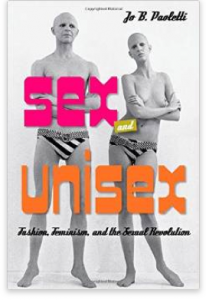 Two new books have recently come onto my radar, both too good not to share.
Two new books have recently come onto my radar, both too good not to share.
The first is by Jo Paoletti, Associate Professor of American Studies at University of Maryland, and is titled Sex and Unisex: Fashion, Feminism, and the Sexual Revolution. I’ve been a fan of Jo’s since reading (and rereading) her previous and excellent book, Pink and Blue: Telling the Boys from the Girls in America. Here’s more about her new one, published by Indiana University Press, and now available:
Notorious as much for its fashion as for its music, the 1960s and 1970s produced provocative fashion trends that reflected the rising wave of gender politics and the sexual revolution. In an era when gender stereotypes were questioned and dismantled, and when the feminist and gay rights movements were gaining momentum and a voice, the fashion industry responded in kind. Designers from Paris to Hollywood imagined a future of equality and androgyny. The unisex movement affected all ages, with adult fashions trickling down to school-aged children and clothing for infants. Between 1965 and 1975, girls and women began wearing pants to school; boys enjoyed a brief “peacock revolution,” sporting bold colors and patterns; and legal battles were fought over hair style and length. However, with the advent of Diane Von Furstenberg’s wrap dress and the launch of Victoria’s Secret, by the mid-1980s, unisex styles were nearly completely abandoned. Jo B. Paoletti traces the trajectory of unisex fashion against the backdrop of the popular issues of the day—from contraception access to girls’ participation in sports. Combing mass-market catalogs, newspaper and magazine articles, cartoons, and trade publications for signs of the fashion debates, Paoletti provides a multigenerational study of the “white space” between (or beyond) masculine and feminine.
You can read more about Jo’s work on “gender mystique” at her website, www.pinkisforboys.com.
The second is an anthology edited by my pal and former Girl w/Pen blogger Shira Tarrant, Associate Professor of Women’s, Gender, and Sexuality Studies at California State University, Long Beach. Gender, Sex, and Politics: In the Streets and Between the Sheets in the 21st Century (Routledge July 2015) isn’t available yet, but you can sign up here on Amazon to get notified when it is. Here’s a descript:
Gender, Sex, and Politics: In the Streets and Between the Sheets in the 21st Century includes twenty-seven chapters organized into five sections: Gender, Sexuality and Social Control; Pornography; Sex and Social Media; Dating, Desire, and the Politics of Hooking Up; and Issues in Sexual Pleasure and Safety. This anthology presents these topics using a point-counterpoint-different point framework. Its arguments and perspectives do not pit writers against each other in a binary pro/con debate format. Instead, a variety of views are juxtaposed to encourage critical thinking and robust conversation. This framework enables readers to assess the strengths and shortcomings of conflicting ideas. The chapters are organized in a way that will challenge cherished beliefs and hone both academic and personal insight. Gender, Sex, and Politics is ideal for sparking debates in intro to women’s and gender studies, sexuality, and gender courses.
Happy reading, Penners!
I invite you to join my Facebook community, pin with me on Pinterest at Tots in Genderland, follow @girlmeetsvoice, and subscribe to my quarterly newsletter to keep posted on coaching, workshops, writings, and talks.




